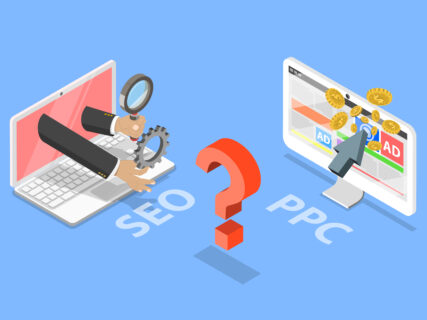
10 mins
OpenSEO vs PPC: The pros, cons, and how they can complement each other in a search campaign
5 mins
In order to get the information and results that you need from your digital marketing or SEO agency, it’s about creating a relationship. You need to be able to ask them the right questions.
9th October 2015

Everyone wants to be on page one for their key search terms. But with long life websites, bigger brands and high competition, not everyone can be on the first page, let alone position one.
Working with an SEO agency, or digital marketers of any kind, is about creating a relationship. In order for it to be a good and profitable relationship, you need to be able to communicate.
Unfortunately, when two groups who work in niche industries get together they tend to only talk in terms of what they know. It makes sense. But it can also lead to miscommunication or you feeling like you aren’t being heard.
In order to get the information and results that you need from your SEO agency, you need to be able to ask them the right questions. Using three questions we’re often asked, we’ll explore how to frame your query in order to get to what you really need to know.
Everyone wants to be on page one for their key search terms. But with long life websites, bigger brands and high competition, not everyone can be on the first page, let alone position one. Asking your SEO agency when you’ll be on page one and how much it will cost can never have a concrete answer. Why? Because search engines are constantly changing and there isn’t one rulebook.
That doesn’t mean that they can’t get you in front of the right audience. But you have to set realistic expectations, not simply ideal ones. In order to get results that are worth your while, you’ll need to choose the right keywords.
For example, a small plumbing business in York is unlikely to rank for a keyword such as ‘plumber’. If asked, “can I get to page one for ‘plumber’?” an SEO agency will truthfully tell you “no, because the competition is too high”. Ask instead “which keywords could I get to page one for?” and your agency might offer: “as a small business, you could rank on page one for a more specific keyword search term, such as ‘plumber in York’”.
Targeting local search, like “plumber in York” with your SEO campaign and your site is much more likely to get to page. And it’ll cost a lot less.
Getting your SEO company to agree to a set target for conversions per week, month or year is not really feasible.
Conversions are very important for your business and your SEO agency will recognise that. However, unless you are working with an in-house SEO team, they won’t know how you are measuring your conversions. A conversion can be marked as a lead, such as phone call or email through the site, a purchase or a click on a certain page of your site.
Getting your SEO company to agree to a set target for conversions per week, month or year is not really feasible. A business requires a certain income to continue trading but an SEO agency won’t be privy to those numbers. More than that, an SEO’s job is to optimise your site for search and user experience, not to convert those leads. That is the role of a sales team.
Rather than focusing on the conversions the SEO campaign will bring, you need to be more granular with your focus for the campaign. One of two questions will help your SEO agency to get you the right results. They are:
If your goal is only to drive sales, a very end of the line goal, then you need to be asking your SEO agency: “What is the best way to get conversions that lead to sales?”. In order to drive purchases, aside from needing an effective sales team on your end, you need to be found in search, found for the right terms and have a site that searchers want to use.
An SEO agency can optimise your site, advise on functionality, user experience and copy. Over time these tactics will put you in front of the right audience, increase your position in search, help visitors enjoy the experience and encourage them to convert.
If your goal is to be more visible in search overall, either because you are a new business and consider this a part of a broader branding and marketing exercise or because you have fallen down the rankings and just want to be able to get back up there, sharing this objective with your SEO agency will help them take a more focused approach.
The problem with gauging the number of links you achieve is that you and your agency could lose sight of link quality.
Links, also known as earned media, link building and blogger outreach is a much talked about part of SEO. How important links are is up for debate within the SEO community even today. But the expert SEOs at Moz, who have a lot of data at their fingertips, note that ranking without any links isn’t really possible.
One issue that can arise between you and your SEO agency is about the number of links they achieve per month/year for your site. Links, or inbound links, are sites and blogs that have a clickable link pointing to your site from theirs.
The problem with gauging the number of links you achieve is that you and your agency could lose sight of link quality. Both clients and SEOs can become obsessed with the number of links a site gets, but if you are only looking at numbers you can miss the plot.
For example, are the links from spammy sites that will link to anyone for a fee? Are those links on platforms that are authoritative and have an actual audience? Or are they drawing in any referral traffic?
Links can benefit your site in two ways:
During the course of your campaign, avoid asking “How many links am I getting?”. Instead try to ask: “Which links are helping my site the most and how?”
Links that are obtained primarily for link juice should always be relevant to your site, or else it would be bad SEO, but these usually reference you or your brand as an example or reliable resource. They are not intended to market to your customer audience and therefore are very unlikely to drive referral traffic that converts.
A link meant to drive traffic with potential to convert might, by contrast, include links to specific product pages and be targeting buyer sites rather than news sites.
It’s fair to say that regardless of what your website advertises, SEO will help it be found by more people. But SEO isn’t about finding a quick trick to get your site or brand noticed, only for it to fall off the face of search a couple of months later. SEO should always be about helping your site be in the best position to put buying customers in touch with your company.